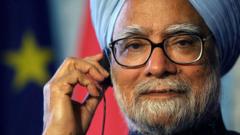Born in what is now Pakistan, Manmohan Singh emerged as a significant figure in Indian history, serving as a two-term prime minister from 2004 to 2014. His recent passing has sparked reflections on his tenure, characterized by quiet determination and transformative leadership. Despite his soft-spoken nature, Singh's impact on India's trajectory was profound, launching the nation into a phase of robust economic growth through pro-market reforms he implemented as finance minister.
Regarded as a politician who chose peace over conflict and reason over theatrics, Singh's approach often drew mixed reactions. While his colleagues praised his integrity and careful navigation of political waters, detractors criticized his perceived lack of assertiveness. Singh's unpretentious style endeared him to many, setting him apart in a political landscape dominated by more boisterous personalities.
His tenure also bore witness to substantial historical moments, including a public apology for the 1984 anti-Sikh riots, an unprecedented act that resonated healing among the affected communities. Meanwhile, Singh's administration successfully negotiated a landmark nuclear deal with the United States, positioning India on the global stage after decades of isolation.
However, Singh's leadership faced profound challenges as allegations of corruption and scandals began to overshadow his accomplishments. The 2008 Mumbai terror attacks and his handling of rising public discontent during anti-corruption movements exemplified the trials he encountered in office. As criticism mounted, many questioned whether Singh's calm demeanor masked weakness rather than the strength he had once demonstrated.
Profoundly, his legacy resonates deeply within India's middle classes, who once regarded him as a beacon of hope amidst political intrigue. His affirmations about fiscal policies, striving towards inclusive development, and support for education reform remain pivotal in assessments of his leadership.
When he chose not to contest for a third term, Singh articulated a sentiment of conviction about his contributions, asserting that history would evaluate his leadership more generously than contemporary narratives. Following his death, this affirmation stands true as discussions focus not just on the controversies that marred his later years but the dignity, integrity, and resilience that defined his journey as a public servant.
Manmohan Singh leaves behind a complex legacy – one that interweaves policy success with personal humility, culminating in a narrative of a leader who, despite facing adversity, approached governance with an unwavering gentleness grounded in profound strength.




















